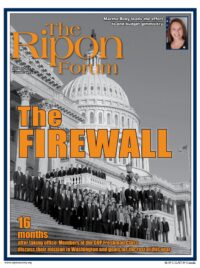
Barack Obama is crisscrossing the country touting his record on employment, including an $80 billion bailout of the auto industry and $800 billion in stimulus spending. What he doesn’t say much about is the persistent lack of job creation related, in part, to his administration’s regulatory excesses.
Despite the president’s costly efforts, unemployment remains stubbornly high. The March figure of 8.2% represents 12.7 million Americans without jobs — 42% of whom have been without work for 27 weeks or more, according to the Bureau of Labor Statistics. (That’s more unemployed than before the stimulus splurge.) Although the economy added 120,000 jobs in March, the number of people working or actively seeking work fell by nearly 170,000 that month.
Try as Obama does to shift the blame for the dismal numbers, the deluge of regulations during his administration is diverting tens of billions of dollars from business investment to complying with government dictates. In much the same way that high taxes undermine the economy, these escalating costs of regulation translate into fewer jobs.
Try as Obama does to shift the blame for the dismal numbers, the deluge of regulations during his administration is diverting tens of billions of dollars from business investment to complying with government dictates.
There is no official accounting of total regulatory costs, and estimates vary. Unlike the budgetary accounting of direct tax revenues, Washington does not track the total burdens imposed by its expansive rulemaking. A very rough extrapolation by economists Mark Crain and Nicole Crain pegs annual regulatory compliance at more than $1.75 trillion.
But by mining the Federal Register and various government databases, new regulations may be identified, and costs can be calculated from agency estimates. From such data mining, the Heritage Foundation has documented that overall, from the start of the Obama Administration to January 20, 2012, a total of 10,215 rulemaking proceedings were completed. Those included 244 rulemakings classified as “major,” meaning that each had an expected economic impact of at least $100 million per year. Of those, 106 increased burdens on private-sector activity, with an estimated cost of $46 billion annually.
The actual cost of these new regulations is almost certainly higher than the totals reported here. This is largely because the agencies that perform the analyses have a natural incentive to minimize or obfuscate the costs of their own regulations. For some, costs are only partially quantified; for others, not quantified at all.
By way of comparison, the George W. Bush Administration adopted 28 major regulations in its first three years. In terms of cost, the gap was even wider, with $8.1 billion in new annual regulatory costs imposed during the first three years of Bush compared to the $46 billion imposed during the Obama years to date, a five-to-one ratio.
And many more are on the way. The most recent Unified Agenda (also known as the Semiannual Regulatory Agenda) — a bi-annual compendium of planned regulatory actions as reported by agencies — lists 2,576 rules (proposed and final) in the pipeline. The largest proportion — 505 rulemakings — is from the Treasury Department, the SEC, and the Commodity Futures Trading Commission — all tasked with issuing hundreds of rules under the massive Dodd–Frank statute. The Environmental Protection Agency is responsible for 174 others, while 133 are from the Department of Health and Human Services, reflecting, in part, the regulatory requirements of Obamacare.
Of the 2,576 pending rulemakings in the fall 2011 agenda, 133 are classified as “economically significant.”
Of the 2,576 pending rulemakings in the fall 2011 agenda, 133 are classified as “economically significant.” With each of these expected to cost at least $100 million annually, they represent a total additional burden of at least $13.3 billion every year.
Excessive regulation, of course, cannot be blamed on this White House — or any White House — alone. A great many of the rules and regulations imposed each year are mandated by Congress, and many others are made possible by intentionally ambiguous statutory language. Others are promulgated by so-called independent agencies not subject to White House control (although they are run by presidential appointees).
That said, the most costly and onerous regulations of late have come straight from the Oval Office: the radical government takeover of health care, the Environmental Protection Agency’s crusade against (so-called) greenhouse gases, and the Dodd-Frank financial strangulations. Conversely, instances of the Administration reducing regulatory costs have been virtually non-existent — Obama’s pledges notwithstanding.
In actuality, the president has been quite candid about exploiting regulation when Congress won’t cooperate. That’s intrinsic to Obama’s new favorite slogan, “We Can’t Wait.”
But his regulatory ambitions are imposing a tremendous cost on the nation — that is, economic malaise and millions of unemployed men and women.
Diane Katz is a Research Fellow in Regulatory Policy at the Heritage Foundation.




